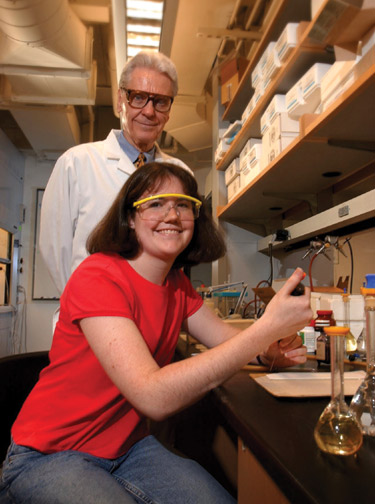Trustee Scholarship recipient Alison Campbell ’04 is spending the summer surrounded by dietary supplements, caffeine pills, soda, coffee, and tea. She is working on three research projects as an EXCEL Scholar with Joseph Sherma, professor emeritus of chemisty.
“I can see already that she’s extremely efficient and independent in getting her work done,” Sherma says. “I have great hopes that we’ll end up with three publications by the end of the summer.”
For the first project, Campbell, a biochemistry major, is using thin-layer chromatography to analyze the contents of beta carotene dietary supplements to determine if they contain the amount of active ingredient stated on their labels, says Sherma.
“There’s a big concern now about the safety of these supplements,” he says, explaining that their contents are not regulated by the government and consumers have no way of knowing exactly what they’re getting. “We’re trying to develop an improved method for analyzing samples we collect from drug stores and other places. The project is very important from a health standpoint.”
Campbell, who dissolves the tablets and separates them into their various components, says that within two weeks, she had already discovered that the labels are often wrong.
“In some cases, there was almost 200 percent recovery,” she says, explaining that she found nearly twice the amount of active ingredient as indicated on the label.
Campbell’s second project involves analyzing the amounts of caffeine in a variety of products by placing a thin-layer chromatography plate containing samples of the products on a flatbed scanner fitted with a special ultraviolet light that can show “spots” in a dark band on the plate. Campbell is currently working with instrumentation specialist Michael Chejlava to install the ultraviolet light. After that, she will begin scanning images into a computer and using a specialized program to analyze the dark “spots” that the light reveals.
The equipment normally used for similar analyses costs between $25,000 and $30,000. Using a simple $200 scanner “can make quantitative thin-layer chromatography much cheaper,” says Sherma.
The third project involves comparing commercial plates used in preparative-layer, or “thick-layer” chromatography.
Campbell, a Trustee Scholarship recipient who spent her sophomore year conducting EXCEL research with Chip Nataro, assistant professor of chemistry, says her work with both professors has been interesting and challenging.
“It’s not something that most undergraduate students have the opportunity to do,” she says.
Campbell has presented research at the Intercollegiate Student Chemists Convention. She plays clarinet in the Pep Band and is a member of the campus chapter of the American Chemical Society. She has also served as a peer tutor in chemistry and third-grade reading tutor through the Landis Community Outreach Center. She hopes to continue her studies in graduate school.

Goldwater Scholarship. Alison Campbell ’04 received a Goldwater Scholarship, the premier national undergraduate award of its type in math, science, and engineering. One of her research mentors is Joseph Sherma, professor emeritus of chemistry.
